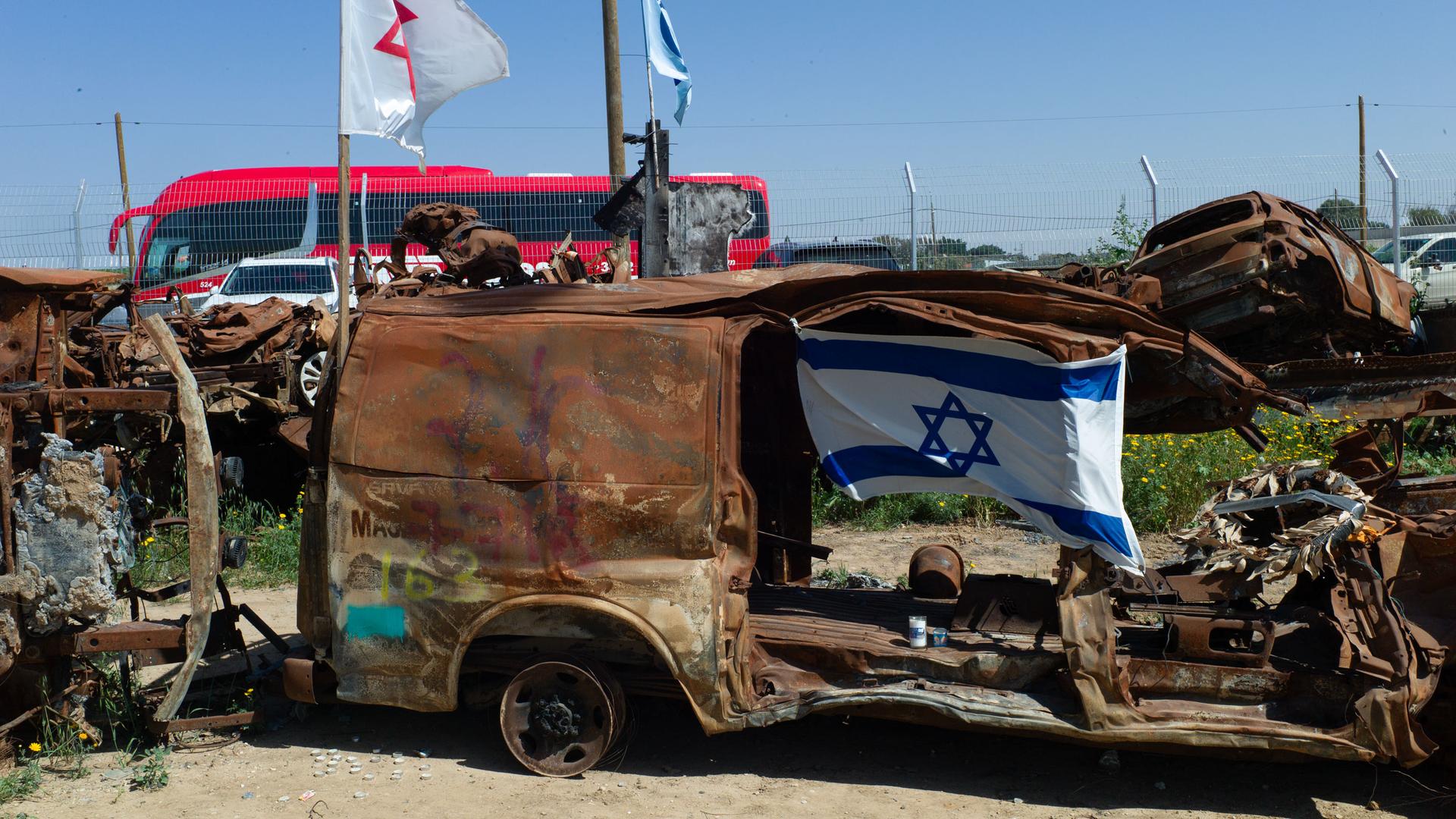‘I’m processing’: Israelis and international tourists visit sites of Oct. 7 attacks
In the Israeli town of Tkuma, about 3 miles from the Gaza Strip, vehicles in various states of destruction sit in a giant lot.
It resembles a graveyard for cars — many are just brown shells with the paint burned off from the attacks by Hamas militants on Oct. 7, 2023.
A lot of these cars belonged to people attending the Nova music festival. Many tried to escape in them, only to be chased down by Hamas and attacked.
“I call it the largest murder scene of the modern era, if you want. Over here there are over 1,650 vehicles that were brought into this place,” said reserve Capt. Adam Ita, an Israeli Defense Forces spokesman for Israel’s southern district.
Six months after Hamas militants attacked several areas in southern Israel, Israelis and foreign visitors continue to go to those sites for various and complex reasons.

In April, when The World visited, Ita talked about why the site is important, first and foremost, as a source of forensic evidence. During the interview, a crowd of some 30 onlookers led by an Australian guide gathered around him to hear his remarks.
Other people were also entering the site, arriving on tour buses, also to witness this scene of carnage from Oct. 7.
Similar crowds gathered in other spots where attacks took place.

In the city of Sderot, a local police department waged a battle against Hamas fighters on Oct. 7.
Today, a memorial to honor the police officers who died in battle draws Israelis and foreign tourists alike.
The building where the police station used to be has been razed. In its place is gravel and a marker in the center of the ground surrounded by hundreds of candles.

Jeffrey Stern, from Westport, Connecticut, visited this site after already spending several days visiting other places that Hamas attacked.
“Prior to this,” he said, “we’ve been seeing the path of the terrorists. Clearly they had maps, so you can see them take a turn and back up, like we would do looking for a friend’s home.”
Stern spoke passionately about how these events unfolded.
“I’m just trying to experience, and therefore sympathize and identify with [the victims],” Stern said.
“I’m just trying to experience, and therefore sympathize and identify with [the victims].”
Jeffrey Stern, tourist in Israel
For some, visiting sites of violence can be seen as voyeuristic. Stern said he knows people who have chosen not to visit these sites for this reason, and he respects that.
“But on the other hand, I also feel I’m a little bit of a witness. I want to be able to tell my grandkids what I saw,” he said.
Tamar Ben-Yosef had just arrived in Sderot and was actually wrestling with why she was there. Ben-Yosef was born in Israel, served in the IDF, and now lives in Anchorage, Alaska.
She said she was here to pay her respects but also to see for herself and learn more directly about what happened on Oct. 7.
“I’m processing … a lot of processing … trying to determine if it’s respectful or voyeuristic, but mostly, I feel like I need to see it to truly process,” Ben-Yosef said.

She added that people consume their news without taking the time to understand and learn about a place and all the complexities of it.
“It’s all very black and white and good and bad, and that’s just not how the world operates. We’re not like that as people. I can’t listen to the news. I’d rather be here, talk to people and educate myself in other ways,” Ben-Yosef said.
“I can’t listen to the news. I’d rather be here, talk to people and educate myself in other ways.”
Tamar Ben-Yosef, tourist in Israel
With war waging in Gaza just over the border, and the threat of rockets at any moment entering Israel, there’s a surreal factor here that Ben-Yosef said she reflects on a lot.
“I think that my existence has always been one of never knowing exactly where to stand. There’s my moral compass and values. And the situation doesn’t fit any of that. The Middle East is different because Israel exists for better or for worse,” Ben-Yosef said.
Israel’s history has not even reached the century mark. But the itinerary of places beset by violence feels like it’s outpaced the country’s age.
The debate in Israel over a temporary or permanent ceasefire continues.
Some say a ceasefire is tantamount to giving up and allowing the enemy to win. Others say giving Palestinians in Gaza respite from the fighting would enable them to bring aid into the besieged enclave.
After a burst of optimism earlier this week, hopes are fading that any deal might be reached soon.
